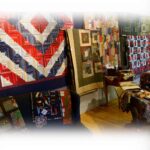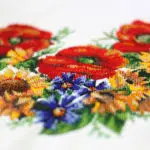A quilt is a type of bed cover, traditionally composed of three layers of fiber, a woven cloth top, a layer of batting or wadding, and a woven back, combined using the technique of quilting. A quilt is distinguishable from other types of blankets because it is pieced together with several pieces of cloth.
National Quilting Day recognizes quiltmakers and their quilt-making abilities. The word ‘quilt’ comes from the Latin word ‘culcita,’ which means stuffed sack, it became adapted to the English language from the French word ‘cuilte.’
Quilting practices can be found in almost every area of the world and it is celebrated on the third Saturday in March every year. The National Quilting Association started National Quilting Day in 1991 and since then it has grown into a global celebration for all quilt lovers and makers.
History of National Quilting Day
Quilting refers to the technique of joining at least two fabric layers by stitches or ties. The quilting practice dates back as far as 3400 B.C. It was mainly a practical technique that provided physical protection and insulation. However, decorative elements were often also present and many quilts are now primarily art pieces.
In the United States, quiltmaking was common in the late 17th century and early years of the 18th century. In these times, only the wealthy had the time to practice quilting so it was done by only a few persons. Commercial blankets or woven coverlets were a more economical bed covering for most people unlike the colonial quilt bed covering which displayed the fine needlework of the maker, such as the Baltimore album quilts. Presently, quilting is now a popular hobby, with an estimated base of twenty-one million quilters.
The oldest example of a quilted piece is kept at the Saint Petersburg department of the Russian Academy of Sciences, Archaeology section. It is a linen carpet that was found in a Mongolian cave, between 100 B.C. and 200 A.D.
The origin of the quilting day can be traced to the Quilters Day Out, which was organized by the Kentucky Heritage Quilt Society in 1989 to celebrate the ancient tradition and its practice in the state of Kentucky. Two years later, this event became so popular that the National Quilting Association decided to declare an official holiday for quilting. From this day, the name changed from Quilters Day Out to National Quilting Day. Over the years, this event has attracted people to celebrate from all over the world and participate in helping to build and maintain the global heritage of quilting.
The first remnants of quilting were dated to 3400 B.C., showing that this art form had existed far into pre-history. They were traded extensively until sometime in the 12th century when these types of trade goods were returned from the Middle East by the Crusaders. Since then, it had become an integral part of the Colonial textile arts and one of the things they were well known for.
National Quilting Day timeline
During American Colonial times, quilts are known to be predominantly whole cloth quilts. Later on, pieced and applique quilts begin to appear.
Quilters Day Out is first organized by the Kentucky Heritage Quilting Association in 1989, which later leads to the birth of National Quilting Day.
In June, members of the National Quilting Association pass a resolution in Lincoln, Nebraska, for the celebration of National Quilting Day.
The National Quilt Museum is honored to host a collection of quilts from the 9/11 Memorial and Museum for the commemoration of the 20th anniversary of the September 11 attacks.
National Quilting Day FAQs
When do people celebrate National Quilting Day?
National Quilting Day is celebrated on the third Saturday in March annually.
What month is National Quilting Month?
National Quilting Month is celebrated during the month of March.
What are the types of quilts?
There are three types of quilts, namely patchwork quilts, applique quilts, and embroidered quilts.
How to Celebrate National Quilting Day
Hang quilts outdoors
On National Quilting Day, quilts are hung outside the homes to educate and inspire people to join in celebrating this ancient creative skill and as a sign that you recognize this event and that you are observing it.
Show your quilting skills
This holiday is a time to share your skills with others by offering to teach a simple quilt project A.M.D. showing them how it’s done. You can decide to teach this to your relatives/family members, schools, neighbors, friends, or a youth group.
Make it a service day
On this day, you can work on a quilt for your favorite cause — either national or local projects. You can also check departments and facilities like the police and fire departments, nursing facilities, or children’s services to see if they have a need for quilts.
5 Fascinating Facts About Quilting
The origin of the word
The word ‘quilt’ comes from the Latin word ‘culcita’, meaning a stuffed sack.
There is an identity behind a quilt
It would interest you to know that quiltmakers make the quilts in such a way that depicts the quality of their lives or custom. Think of it as a book of tradition where pieces of stories are sewed together.
A precious heritage
Apart from the professional quiltmakers, women of the old generation can make a traditional quilt and it is passed down from one generation to the other; from grandmother to mother and mother to daughter.
For armor protection
Medieval knights used quilted pads under their armors, to protect them from chaffing and to prevent the armor from rusting from sweat.
Interest for the husband
During the 19th century, it was customary for a woman to show her quilting skills to her new husband.
Why We Love National Quilting Day
It’s a day for fun
It is a day to share in the fun and appreciate the history of quilts; to share quilting stories, fabrics, and patterns.
It’s a time to reflect on the old times
Quilting is a practice that can be dated as far back as 3400 B.C. Quilting day allows us to appreciate this old-time art, understand the history, and value it, like a connection between the past and present, creativity and heritage.
It’s a day to understand its symbolism
Quilts often symbolize resourcefulness, as quilters use what resources are available to them to make a quilt covering. They also symbolize heritage.
National Quilting Day dates
| Year | Date | Day |
|---|---|---|
| 2022 | March 19 | Saturday |
| 2023 | March 18 | Saturday |
| 2024 | March 16 | Saturday |
| 2025 | March 15 | Saturday |
| 2026 | March 21 | Saturday |




































